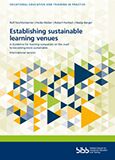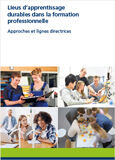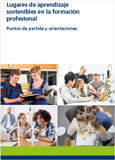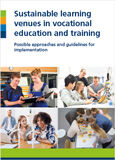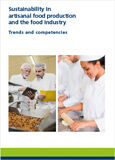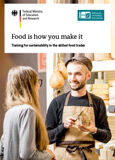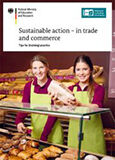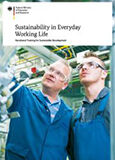Developing sustainability in vocational education and training
BIBB pilot projects
Vocational education and training is the key to sustainable development. BIBB has a long-lasting tradition of promoting VETSD-pilot projects anchoring sustainability in vocational education and training.

Sustainable development requires a paradigm shift in the economy and in the world of work. There is a clear need for a change in attitudes and organizational competencies and employability skills geared towards sustainability. Since 2004, several pilot projects have been initiated with the aim of developing possible solutions for this.
Pilot projects are an instrument for developing and testing new, innovative methods on an exemplary basis, which can contribute to improving the quality of vocational education and training and provide tools to support its modernization. On behalf of the Federal Ministry of Education and Research (BMBF), the BIBB supports pilot projects in the field of extracurricular vocational education and training (practice models) in accordance with Article 90, Section 3 No. 1d BBiG (German Vocational Training Act). Practice pilot projects pursue the goal of transferring innovations and findings into practice, research and politics.
The main focus of funding of the pilot projects on sustainability in VET attaches particular importance to the structural development of the concepts to be developed in the VET system. The pilot projects are intended to support the guiding principles of the World Action Programme “from Project to Structure”. Particular importance is placed on ensuring that both transfer stakeholders as well as serviced providers contribute to anchoring sustainable development in vocational education and training.
Pilot projects
Funding Line I (2015-2019)
Development of training and qualification concepts for sustainability in commercial occupations
Six pilot projects developed domain-specific sustainability-oriented concepts for competence development in commercial professions, i.e. i.e. retail, wholesale and foreign trade, logistics services.
Funding Line II (2015-2019)
Establishment of a sustainable learning venue in vocational education and training institutions
For the creation and development of a sustainable learning venue in dual vocational training in training companies, inter-company vocational training centers, vocational schools and other educational institutions for dual vocational training, six pilot projects were funded.
Funding Line III (2018-2021)
Development of domain-specific sustainability competencies in food sector occupations in the craft trades and in industry
The processes of producing, processing and consuming food has an essential influence on the sustainable development of our society. Thus, six pilot projects for sustainable competence development in the food sector (food-craft and food-industry) were funded.
BBNE Transfer (2020-2022)
Vocational training for sustainable development in transfer for training personnel 2020-2022"
This funding programme aimed to transfer selected proven results and products of the previous BBNE pilot projects (2015-2019) from project to structure, generating both practical and scientific knowledge and insights on innovation transfer.
Materials
As a result of the various pilot projects, a range of materials has been made available to support education and training practice: These include general recommendations for the design of education and training, as well as teaching and learning materials and tools for specific professions. Some of the results are also available in English.
Learning Modul 1 "Sustainable Development"
Notes for Trainers/Teachers
Notes for Trainees/Students
Sustainability in the transport and logistics sector
Introduction and summary
Carbon and water footprint
For trainers/teachers
For trainees/students
Combined transport!?
For trainers/teachers
For trainees/students
Simulation "Combined Transport" For trainers/teachers
Simulation "Combined Transport" Copy templates
Sustainable (customer requirements)
For trainers/teachers
For trainees/students
EU disclosure requirements
For trainers/teachers
For trainees/students
Dealing with contradictions
For trainers/teachers
For trainees/students
Systemic visualisation, Method Cards
Energy saving and energy efficiency
For trainers/teachers
For trainees/students
Thinking about resources
For trainers/teachers
For trainees/students
Design Thinking, Method Cards
Modul "Corporate Social Responsibility" (CSR)
For trainers/teachers
For trainees/students
Digitalisation leads to more sustainable business practices?
For trainers/teachers
For trainees/students
Design Thinking, Method Cards
Competency Model for VETSD in the Food Crafts and Food Industry
The competency model for vocational education and training for sustainable development (VETSD) in the food crafts and food industry is one of the main results of the work of the scientific supervision of the pilot projects of the third funding line “Vocational Education and Training for Sustainable Development 2015–2019”. It defines sustainability-relevant core competencies and associated competency goals and thus could serve as a basis for the didactic conception and design of teaching/learning processes and curricular development. Nov. 2022
Strotmann, Christina / Kastrup, Julia / Casper, Marc / Kuhlmeier, Werner / Nölle-Krug, Marie / Kähler, Anna-Franziska
Corporate Responsibility, Sustainability and Markets - How Ethical Organisations and Consumers Shape Markets
In: Simões C., Stancu A., Grigore G. (eds) Corporate Responsibility, Sustainability and Markets. Palgrave Studies in Governance, Leadership and Responsibility. Palgrave Macmillan, Cham., 2021, S. 142-162.
Reinhardt, Kai / Schwarzkopf, Julia / Ermer, Carolin
From project to structure - findings from BIBB pilot projects on VETSD for anchoring sustainability
There is increasing recognition that sustainability requires a solid structural basis in vocational training and is not limited to individual projects. However, one question that remains largely unclear is how sustainability can be specifically integrated into in-company training. The pilot projects "Vocational Education and Training for Sustainable Development" (VETSD) of the BIBB provide suggestions in this regard. The article looks back at the pilot projects of the past 20 years and identifies five dimensions that offer starting points for the structural integration of sustainable development into vocational training.
Barbara Hemkes, BIBB / Christian Melzig, BIBB
UNESCO-UNEVOC Virtual conference - New qualifications and competencies - Pilot-project Pro-Deenla
This presentation gives an overview of the pilot-project Pro-Deenla. The presentation was made by Verónica Fernández (BIBB) and Harald Hantke (Leuphana University Lüneburg).
